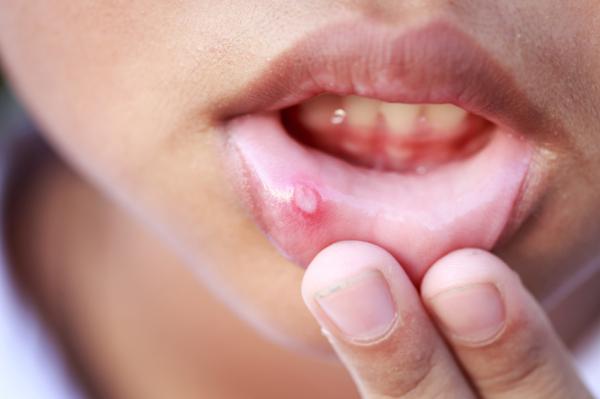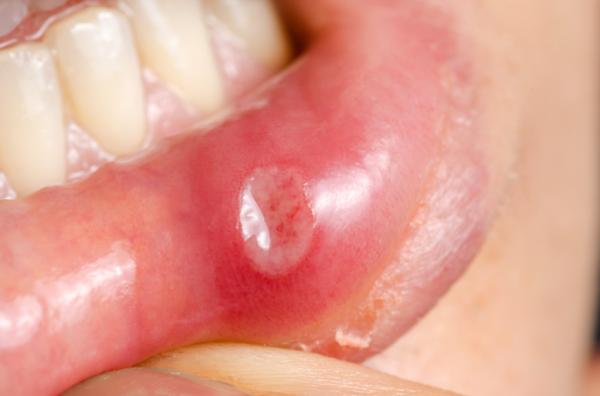
Mouth ulcers normally appear when something in the body is wrong. These ulcers, also known as apthtae ulcers are very painful for several days and usually appear on the inside of the lip or mouth. Fortunately these sores do not leave any scars and they go away as easily as they appear. Find out in this oneHOWTO article what are the causes of mouth ulcers.
Mouth uclers due to friction
The causes of mouth ulcers are poorly understood. It is thought that they appear most frequently after a physical lesion such as biting your cheek, or as a result of a sharp tooth poking it. To avoid mouth ulcers, make sure to chew your food slowly. If they are a result of wearing a mouthpiece or braces, look into placing wax in the sharp areas to avoid them cutting your mouth.
Mouth ulcers due to stress
Stress is another possible cause of mouth ulcers. It appears that when someone is under more stress than usual, they are more likely to get mouth ulcers. To prevent mouth ulcers, and to increase your wellbeing, it is important to learn to manage stress and anxiety. In this case, you may also suffer from buringing mouth syndrome (burning sensation in the tongue).
Mouth ulcers due to microbial diseases
Having low bodily defences, which in turn makes you prone to microbial diseases and may cause mouth ulcers. The best thing to do in this case is to find ways to improve your body's defenses. Eating healthy and exercising regularly is a guaranteed way to boost your immune system, and making sure you get plenty of Vitamin C and zinc won't hurt either.
However, very large mouth ulcers or those that appear frequently may be a sign of an underlying disease or condition. They may be the result of a vitamin deficiency, a nutritional intolerance, a gastrointestinal disorder or a weakened immune system.
If you have ulcers that are larger than 2 mm in diameter, that last longer than 2 weeks, or that are recurring, you should consult a physician to verify the exact cause.
The following are a list of possible microbial causes:
- Herpetic stomatitis
- Chickenpox
- Herpes zoster (you may also suffer from orofacial pain)
- Hand, foot and mouth disease
- Herpangina
- Infectious mononucleosis
- HIV infection
- Acute necrotising gingivitis
- Tuberculosis
- Syphyllis
- Fungal infection
Spicy and acidic food
Certain foods may also cause mouth ulcers. Especially spicy or acidic foods, like lemons, oranges and vinegar. Eating these foods when you have a lesion in your mouth may cause the wound to become an ulcer. If you bite your cheek and are prone to ulcers, make sure to avoid spicy and acidic foods, and stick to bland, basic foods.
Ulcers due to smoking cessation
People who have recently quit smoking may also be prone to frequent outbursts according to a study published in the Oxford academic journals[1]. This is only temporary, and should disappear within a four weeks on average. According to this study, mouth ulcers were more prone to appear in those with high dependency, as they are also linked to other withdrawal symptoms.
Ulcers due to cutaneous disease
Mouth ulcers can also be a symptom of a mouth or skin infection, linked directly or indirectly to the mouth and/or digestive symptoms. The most common diseases are the following:
- Lichen planus (you may also suffer from burning mouth syndrome in this case[2])
- Pemphigus
- Pemphigoid
- Erythema multiforme
- Dermatitis herpeformis
- Linear IgA disease
- Epidermolysis bullosa
- Chronic ulcerative stomatitis

Ulcers due to medication
Another reason for the mouth ulcers may be the chronic use of certain medications that alter the digestive tissue lining, known as NSAIDs (like ibuprofen). Moreover, the use of cytotoxic agents and nicorandil may also cause mouth ulcers. Before using any medication for a long time, be sure to consult your doctor.
Ulcers due to blood disorders
You should know that ulcers can also appear as a symptom of several diseases that are blood related and are classified as malignant neoplasms blood disorders, as your body will react to a decrease in white blood cells:
- Anemia
- Leukemia
- Neutropenia
Mouth ulcers due to gastrointestinal diseases
You will also notice mouth ulcers appearing in your mouth as a reaction to certain diseases that affect your gastrointestinal tract, as these are accompanied by a hematinic deficiency such as iron, folate or vitamin B12.
- Coeliac disesase
- Crohn's disease
- Ulcerative colitis
Mouth ulcers due to rheumatoid diseases
Rheumatoid or rheumatic diseases usually affect joints and muscles. Mouth ulcers appear in this case as direct symptoms of these diseases:
- Lupus erythematosus: Known as discoud lupus lesions, they are painless and occure in 40-50% lupus patients.
- Bechcet's syndrome
- Sweet's syndrome
- Teiter's disease

This article is merely informative, oneHOWTO does not have the authority to prescribe any medical treatments or create a diagnosis. We invite you to visit your doctor if you have any type of condition or pain.
If you want to read similar articles to What Are the Causes of Mouth Ulcers?, we recommend you visit our Family health category.
- You should know that mouth ulcers can also appear as a secondary effect of radiotherapy.
- If you have persistent mouth ulcers, it is advisable to visit your doctor to make sure that there are no underlying illnesses causing these aftae.
- https://www.ncbi.nlm.nih.gov/pmc/articles/PMC1071433/
- Scully, Crispian, and Rosemary Shotts. "Mouth ulcers and other causes of orofacial soreness and pain." BMJ: British Medical Journal 321.7254 (2000): 162.